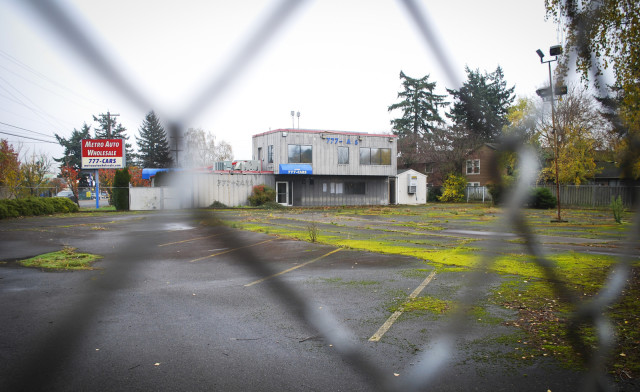The Portland Mercado Rises

Image: Courtesy Portland Mercado
There’s nothing eye-catching about the southeast corner of 72nd Avenue and Foster Road. Drive by at the speed of traffic and you’re likely to miss the old gray building adorned with the peeling paint of a long-abandoned auto wholesale business, its parking lot overtaken by grass and encroaching weeds. You wouldn’t think there was anything there, and there isn’t—but not for long.
Hacienda Community Development Corporation, an organization that works to provide affordable housing and economic advancement for low-income families in Portland, is working to bring a Latino public market to the space sometime in 2014.
The project is picking up steam: they’ve just been awarded a Community Livability Grant of over $200,000 from the Portland Development Commission as part of the PDC’s funding for the Lents Urban Renewal Area. Initial blueprints have been drafted and a contractor has been chosen; the hope is to break ground around the turn of the year.
The finished Mercado will boast an outdoor sitting and eating area, with space for up to eight food carts highlighting the diversity of Latin American cuisine. Inside the Mercado, visitors will find a bakery and cafe, a tortilleria and tienda, a taproom featuring beer and wine from all over Latin America, and other smaller vendors like a candy store and ice cream shop. Many of these businesses are currently part of Hacienda’s small business incubator, Micro Mercantes.
While inspiration for the Portland Mercado was taken in part from Minneapolis’ Mercado Central, which operates as a co-operative, all the businesses who plan to open at Foster and 72nd will be independent entities. The one exception could possibly be the taproom; Hacienda is exploring the idea of operating it as a social enterprise to help offset the costs of maintaining the Mercado.
The recent Community Livability Grant will primarily fund the construction of a commissary kitchen in the Mercado space, a prospect about which the developers are particularly excited. “There’s not a lot of [kitchen] space in southeast for people to use,” says Jamie Melton, the Mercado’s marketing specialist. “It’s mostly churches with limited hours or equipment. We really hope to provide that for small culinary entrepreneurs.” Rates for the use of the kitchen will be affordable and far under market prices: Hacienda’s current commissary kitchen at 67th and NE Killingsworth charges just ten dollars an hour.

The future site of the Portland Mercado.
Image: Nathan Tucker
Plans for the Mercado to retrofit an existing building help keep the project within its modest $1.5 million budget, but the strategy is about more than financial concerns. “It’s an adaptive reuse of a building where you don’t have to demolish it, which wouldn’t be in line with Hacienda’s green values or Portland’s values as a whole,” Melton points out. It’s also in keeping with the ethos of the Foster-Powell and Mt. Scott-Arleta neighborhoods, a part of southeast Portland where abandoned storefronts and structures are slowly being transformed into vibrant businesses and community spaces. “The neighborhood seems ready for this," says Melton. "They’ve been supportive from day one.”
Portland’s first Latino public market won’t just provide the city with a culinary destination and the neighborhood with an economic boon: it will also present a crucial opportunity for cultural education. “This isn’t just another mall or food center. It has to represent Latin culture and its diversity,” says Valentina Orantes, the Mercado’s micro-enterprise manager. The Mercado plans to partner with local schools, as well as to bring a variety of cultural programming to the space, including rotating visual art installations and musical performances. They even plan to show World Cup and Timbers matches.
While the timetable for breaking ground has seen some delays since its inception, the folks at Hacienda aren’t discouraged. If anything, they’re seeing it as a welcome chance to reinforce their preparations: “The vendors that we have chosen are transitioning from the informal to the formal economy, so they really still need to get used to selling their food,” Melton says. “With access to farmers markets and catering events, they’re working on developing their business plans and their goals. By the time we open, they’ll be ready.” So will Portland.
If you would like to support the Portland Mercado project, visit their website here.
Hacienda CDC hosts a fundraising happy hour on Nov 21 at Teatro Milagro, including music, raffle prizes, and food and drink from vendors that plan to be part of the Portland Mercado. RSVP here.